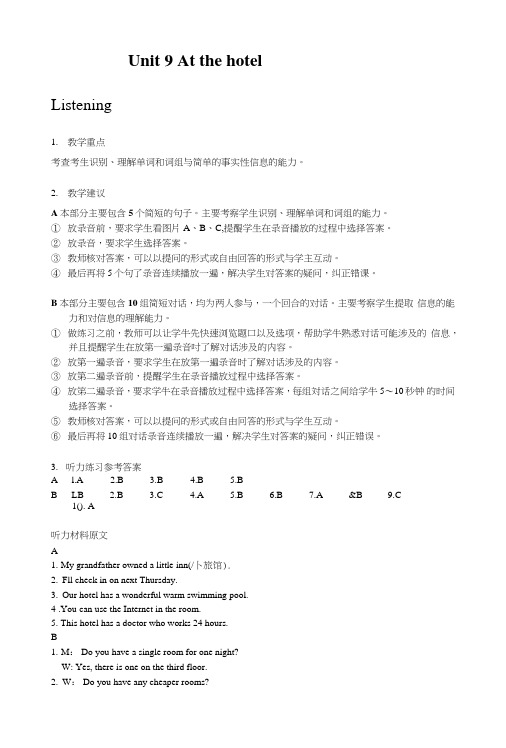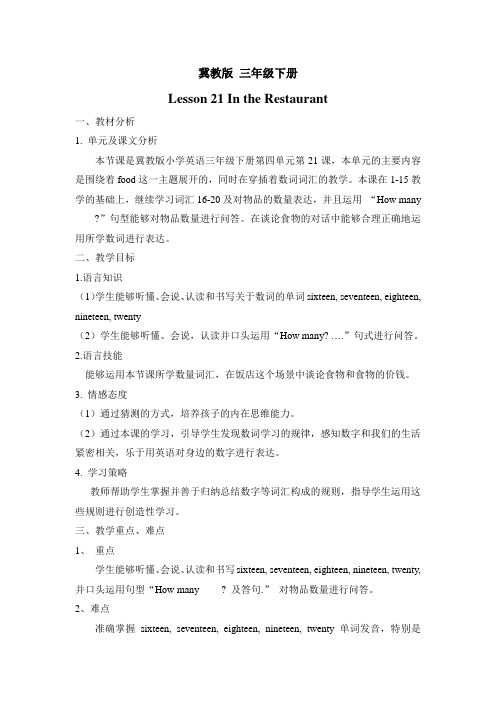饭店英语教学导案
饭店英语教案unit

一、教学目标1. 让学生掌握饭店英语的基本用语和表达方式。
2. 提高学生的口语交流能力和听力理解能力。
3. 培养学生在实际场景中运用饭店英语进行沟通的能力。
二、教学内容1. 饭店英语的基本问候语和介绍语。
2. 饭店各部门的名称及常用表达。
3. 饭店常用服务的英语表达。
4. 简单的英语点餐对话。
三、教学重点与难点1. 重点:掌握饭店英语的基本用语和表达方式。
2. 难点:在实际场景中运用饭店英语进行沟通。
四、教学方法1. 情景模拟法:通过模拟饭店场景,让学生在实际环境中练习英语口语。
2. 互动教学法:引导学生积极参与课堂活动,提高口语表达能力。
3. 听力训练法:通过听录音、观看视频等方式,提高学生的听力理解能力。
五、教学步骤1. 热身活动:让学生用英语进行自我介绍,营造轻松的课堂氛围。
2. 讲解饭店英语的基本用语和表达方式,如问候语、介绍语等。
3. 练习环节:分组进行角色扮演,模拟饭店场景,练习英语对话。
4. 听力训练:播放饭店英语对话录音,让学生进行听力练习。
一、教学目标1. 让学生掌握饭店英语中关于房间预订的常用表达。
2. 提高学生的口语交流能力和听力理解能力。
3. 培养学生在实际场景中运用饭店英语进行沟通的能力。
二、教学内容1. 饭店英语中关于房间预订的常用表达。
2. 饭店英语中关于房间类型的表达。
3. 饭店英语中关于房费和支付方式的表达。
三、教学重点与难点1. 重点:掌握饭店英语中关于房间预订的常用表达。
2. 难点:在实际场景中运用饭店英语进行房间预订。
四、教学方法1. 情景模拟法:通过模拟饭店前台场景,让学生在实际环境中练习英语口语。
2. 互动教学法:引导学生积极参与课堂活动,提高口语表达能力。
3. 听力训练法:通过听录音、观看视频等方式,提高学生的听力理解能力。
五、教学步骤1. 热身活动:让学生用英语进行自我介绍,营造轻松的课堂氛围。
2. 讲解饭店英语中关于房间预订的常用表达,如询问房间类型、房费等。
饭店服务英语

《饭店服务英语》教学大纲(旅游英语专业三年适用)一、课程的性质和目的(一)课程性质《饭店服务英语》是高等职业教育旅游服务类涉外旅游专业酒店管理方向的必修课程。
在涉外酒店管理专业中,本课是实用性较强的课程。
本课程介绍了在酒店业和餐饮业各种场景中的英语知识,并提供练习,帮助学生训练在涉外酒店工作中运用英语的各种技能。
(二)课程的总体教学目的和要求通过本课程的学习,使学生不仅能进一步提高英语基本能力,而且能系统地掌握有关酒店专业的基本知识和服务技能,体现较强的专业实用价值。
在学生已有的英语基础上,继续培养较强的旅游接待服务的听说和自我表达能力。
同时涵盖了英语运用于服务业的各项主要功能,如核实资料、给客人指路、介绍餐饮、提供建议、向客人致歉、了解两种语言文化差异,等等。
同时,在教学中注意加强实践环节,核对学生基本技能的训练和培养,学以致用,以符合高等职业教育应用型人才的培养目标。
二、课程内容本课程根据行业企业发展需要和完成职业岗位实际工作任务所需要的知识、能力和素质要求,以及学生可持续发展的需要选取教学内容。
本课程选用由肖璇主编,世界图书出版社出版的《现代酒店英语实务教程》以及由李秀斌主编,世界图书出版社出版的《现代餐饮英语实务教程》为基本教材。
参考教材为:《朗文现代酒店业英语》,外语教学与研究出版社出版。
课程以饭店的各个主要部分来划分,分为四大讲,它们分别是:饭店前厅部、饭店客房部、饭店餐饮部、饭店康乐健身部、以及饭店其它部门的服务,其中每大讲下面又包含了几个章节,如饭店的前厅部就包括了前厅预定服务、前台接待服务、前台问讯服务、大堂副理服务、前台结账服务以及前厅礼宾服务等几个章节。
三、理论教学内容总学时:64学时(一)CONCLUSIONPart I: A Brief introduction to HotelsPart II: Hotel ServicesChapter 1 Front DeskUnit 1 About Front DeskUnit 2 Room ReservationUnit 3 ReceptionUnit 4 ComplaintUnit 5 Check-OutChapter 2 HousekeepingUnit 1 About HousekeepingUnit 2 Showing the RoomUnit 3 Cleaning the RoomUnit 4 Laundry ServiceUnit 5 Room ServiceUnit 6 Other Housekeeping ServicesUnit 7 EmergencyChapter 3 Other ServiceUnit 1 TelephoneUnit 2 At the Recreation Center(二)Business CenterUnit 1 Secretarial ServicesUnit 2 Taking OrdersUnit 3 Convention ServiceUnit 4 Ticket Service(三)Restaurant ServicePart I Basic Knowledge of Food & Beverage IndustryChapter 1 Brief Introduction of Food & Beverage IndustryChapter 2 Basic Knowledge of Food & Beverage IndustryPart II KitchenPart III Food & Beverage ServiceChapter 1 ReservationChapter 2 Greeting & FarewellChapter 3 Taking OrdersChapter 4 Beverage ServiceChapter 5 Serving at the DinnerChapter 6 Banquet ServiceChapter 7 Bar ServiceChapter 8 Setting the BillChapter 9 Handling ComplaintsPart IV Special Restaurants三、实践教学内容课内实践教学设计课内实践活动主要由课内模拟情景对话组成,实践教学时数为24学时。
(新)饭店服务英语教学大纲计划

《饭店服务英语》课程教学大纲课程名称:《饭店服务英语》英文名称:English For Hotel Service课程代码:学时:60适合专业:旅游英语专业一、课程性质、目的与任务课程性质:《饭店服务英语》是高职院校旅游英语专业的一门必修课,是旅游英语学科体系的重要组成部分。
目的:本课程的目的是,使学生具备掌握英语基础知识和技能以及运用饭店英语的能力,从而达到旅游英语专业学生应具备的整体知识文化水准和相应的业务素质。
任务:通过学习,培养学生在具有一定的公共英语听、说、读、写的基础上,掌握饭店行业服务与管理的专业英语,包括旅游饭店英语的专业词汇、句型和表达方法,使学生基本具备用英语进行旅游饭店行业管理与服务的能力,为从事旅游饭店业工作的需要打下良好的基础。
二、教学基本要求了解旅游饭店英语的常用范围及饭店服务的一般程序。
理解旅游饭店服务英语的专业词汇、句型和表达方法。
掌握旅游饭店行业服务与管理的专业英语,包括饭店服务英语的专业词汇、句型和表达方法,能用正确的英语语音和语调流利地进行对话。
三、教学内容体系旅游分为食(Food and beverage)、宿(Residence)、行(Transportation)、游(Sightseeing)、购(Shopping)、娱(Entertainment)六大部分。
其中食宿是为旅游者提供的最重要的服务。
本课程就是要求学生掌握饭店服务英语。
本课程教学内容从整体上分为以下章节:1.The Front Office Service (前台服务)这部分主要介绍前台的服务功能与作用,其中包括客房预订(RoomReservation)、接待服务(Reception)、礼宾服务(Bell Service)、总台问讯服务(Mail and Information Service)、电话总机服务(Telephone Operator)等。
2.Chamber Service (客房服务)这部分主要介绍一系列常用的客房服务,如打扫房间服务(Room Cleaning Service)、客房送餐服务(Room Service)、满足客人要求服务(Guests’ Requests)、失物认领服务(Lost and Found Service)、损坏与赔偿(Damage and Compensation)等。
饭店英语教学大纲

“饭店英语口语”教学大纲第一部分大纲说明一.课程性质、教学目的、任务和教学基本要求:1.课程性质:本课程系电视中专旅游服务饭店专业英语口语课程,以训练学生的饭店英语口语能力为主。
教材采用由陈根培编写的《饭店服务英语》(English For Hotel Service)。
该课程是饭店服务专业英语口语技能训练课。
2.教学目的:训练学生基本的英语口语表达能力,使之能用英语进行简单的口头交流,在饭店服务中应用英语口语。
3.教学任务:通过大量的课堂口语练习和实践,在本课程结束时,学生能口头使用英语进行饭店服务,听懂饭店客人的要求,正确表达自己的意思。
学生应做到语音语调正确,无重大语法错误,语言基本得体,专业术语运用自如,使服务对象全无语言障碍之不便,反而有宾至如归之感。
4.教学要求:本课程非英语口语入门课,因此,本大纲对学习该课程学生提出以下课前要求:1)语音:学生因能运用国际音标拼读单词,朗读无难度的句子和材料,语音语调大体正确。
2)听力:能听懂简单的课堂英语。
3)口语:能用英语回答一般日常问题。
本课程教程为一学年,分第一、第二两个学期,对学生在各学期的口语能力具体要求下:1)通过第一学期考试的学生应能听懂并运用课堂英语。
对于礼仪、总台、客房部分内容能问达流畅,语音语调达到基本正确,专业术语基本熟练并准确运用。
2)通过第二学期考试的学生除能继续保持原有饭店口语能力外,能熟练掌握餐饮服务专业知识,例如各种酒类(饮料、红酒等),各种餐式(西餐、中餐等)及常用菜名,要求基本能介绍清楚、准确。
通过第五章的学习,能具备综合性饭店服务的口语表达能力,应变各种情况及按客人要求的其他服务。
在口语表达中应能做到富有感情色彩,清切悦耳。
二.本课程与相关课程的衔接、配合关系本课程系旅游饭店服务各专业的一门专业课程,与这些专业所开设的相关中文课程有密切关系,对于中文课程的熟悉很有助于掌握相应的英语表达法。
因此在学习中应对比相同概念在中英文上表达的异同,见到中文应尽可能联想用英语如何来表达。
《饭店工作英语》课程标准

《饭店工作英语》课程标准一、课程性质本课程是中等职业学校酒店服务与管理类酒店服务与管理专业的一门专业核心课程,是在《英语》等课程基础上,开设的一门理论与实践相结合的专业课程。
其任务是培养学生运用专业英语进行饭店服务工作的综合能力,为后续《饭店管理服务》《跨文化交际》等课程的学习奠定基础。
二、学时与学分90学时,5学分。
三、课程设计思路本课程按照立德树人的要求,突出核心素养、必备品格和关键能力,兼顾中高职课程衔接,高度融合饭店知识技能的学习和职业精神的培养。
1.依据《中等职业学校酒店服务与管理类高星级饭店运营与管理专业指导性人才培养方案》中确定的培养目标及综合素质、职业能力要求,突出饭店工作环境中相关岗位的英文对话能力培养,结合本课程的性质和职业教育课程教学的最新理念,确定本课程目标。
2.根据“中等职业学校高星级饭店运营与管理专业‘工作任务和职业能力’分析表”,依据课程目标,以及饭店从业人员等职业岗位需求,围绕饭店服务用语英文表达的关键能力,体现科学性、前沿性、适用性原则,确定本课程内容。
3.参考饭店服务的岗位设置模块,结合饭店相关岗位典型工作任务设计教学单元,将相应的英语语言知识、专业技能与职业素养有机融入所设置的模块和教学内容。
根据学生认知规律和职业成长规律,以饭店服务岗位的工作流程为参考,序化教学内容。
四、课程目标学生通过学习本课程,掌握饭店相关专业术语及服务用语的英文表达,发展从事饭店相关岗位工作所应具备的英语沟通能力,培养自身在饭店交际环境中对英语语言的综合应用能力,为将来从事饭店服务工作奠定良好的基础。
1.具备从事饭店工作所需的实用英语技能。
2.能准确地用英语和客人进行对话,用英语完成饭店实际工作环境中的餐饮服务、前厅服务、客房服务、康乐服务等各项服务工作。
3.能读懂常见的饭店相关的英文资料,会书写简单的英文对客留言、信函和邮件等。
4.了解饭店主要部门的基本流程和要点,掌握饭店主要部门实际工作中服务用语和专业术语的英文表达方式。
中职教育规划教材英语教学参考书—Unit9Atthehotel(教案).doc

Unit 9 At the hotelListening1.教学重点考查考生识别、理解单词和词组与简单的事实性信息的能力。
2.教学建议A本部分主要包含5个简短的句子。
主要考察学生识别、理解单词和词组的能力。
①放录音前,要求学生看图片A、B、C,提醍学生在录音播放的过程中选择答案。
②放录音,要求学生选择答案。
③教师核对答案,可以以提问的形式或自由回答的形式与学主互动。
④最后再将5个句了录音连续播放一遍,解决学生对答案的疑问,纠正错课。
B本部分主要包含10组简短对话,均为两人参与,一个回合的对话。
主要考察学生提取信息的能力和对信息的理解能力。
①做练习之前,教师可以让学牛先快速浏览题口以及选项,帮助学牛熟悉对话可能涉及的信息,并且提醒学生在放第一遍录音吋了解对话涉及的内容。
②放第一遍录音,要求学生在放第一遍录音时了解对话涉及的内容。
③放第二遍录音前,提醒学生在录音播放过程中选择答案。
④放笫二遍录音,要求学牛在录音播放过程中选择答案,每组対话之间给学牛5〜10秒钟的时间选择答案。
⑤教师核对答案,可以以提问的形式或自由冋答的形式与学生互动。
⑥最后再将10组对话录音连续播放一遍,解决学生对答案的疑问,纠正错误。
3. 听力练习参考答案A l.A 2.B 3.B 4.B 5.BB LB 2.B 3.C 4.A 5.B 6.B 7.A &B 9.C1(). A听力材料原文A1.My grandfather owned a little inn(/卜旅馆).2.Fll check in on next Thursday.3.Our hotel has a wonderful warm swimming pool.4 .You can use the Internet in the room.5. This hotel has a doctor who works 24 hours.B1.M: Do you have a single room for one night?W: Yes, there is one on the third floor.2.W: Do you have any cheaper rooms?M: Of course. There are rooms of all kinds・3.W: How long will you stay?M: From Oct. the 10th to the 16th.4.M: Let me show you the room. This one. What do you think?W: It's nice and comfortable but it doesnl have a wardrobe・5.W: Waite匚My husband has broken a cup・ M: Leave it to me.6.M: Sorry, I cannot find the key to my room.W: Never mind. We can handle it.7.W: How about spending our weekend in the Grand Hotel? M: How about the whole week?& W: When will you serve dinner?M: A quarter to eight, madam.9.W: Waiter, are there any Chinese dishes?M: Yes, here is the menu. What would you like to order?10.M: Excuse me・ I want to check out, please・ W: What's your room number, sir?得音夭地教学建议训练4个音素[ei], [ ul,[ail,[aulo如果发现大部分学生做这个练习有困难,教师可把4个音素写在黑板上领读,然示领读带有这4个音素的单词,并鼓励学生联想更多的含有这4个音素的单词。
《饭店英语2》教学大纲-finished

《饭店英语2》教学大纲-finished单位“饭店英语-1”课程教学大纲课程编号:G000742课程类型:专业限选学时:32 学分:2.0适用对象:旅游管理专业一、课程性质与任务课程性质:《饭店英语》是高等职业技术学院旅游管理和酒店管理专业的一门专业基础课,是旅游管理学科体系的重要组成部分。
课程任务:本课程适应我国旅游业尤其是酒店业持续发展的需要,旨在提高学生英语交际能力,从而培养业务精通、英语熟练、全面发展的酒店初、中级管理人才。
《饭店英语》是在学生学习了酒店管理专业相关专业基础课程和公共英语基础课的基础上开设的,在学生已经具有了较好的英语基础上,加强专业英语的学习,从而全面提高了学生的专业英语听说读写技能和酒店管理英语表达,为学生进行毕业实习作最后的提高和准备二、课程教学内容及要求、建议:(一)教学内容及要求:Unit One Welcome to China1)Situational conversation[1]2)Useful expressions[1]3)vocabulary[1]Unit Two The Tour Guides1)Situational conversation[1]2)Useful expressions[1]3)vocabulary[1]Unit Three The Travelers1)Situational conversation[1]2)Useful expressions[1]3)vocabulary[1]1、《饭店英语》是一门实用性较强的课程。
其教学重点在于通过教学使学生在一定程度上掌握饭店实际工作情景中英语对话能力。
应在教学中设置合理、有趣的对话背景,增加学生小组对话练习或演讲;2、课程教学方法的建议:根据《饭店英语》的课程特点,每章都应采用讲练结合的教学方法,并增加练习的时间与强度。
3、将课程单词记忆问题放到课后作业中,教师只针对难度较大以及专业词汇在课堂上进行讲解,以提高教学效率并适度锻炼学生的自学能力。
三年级英语下册优质教案- Lesson 21 In the Restaurant 冀教版

冀教版三年级下册Lesson 21 In the Restaurant一、教材分析1. 单元及课文分析本节课是冀教版小学英语三年级下册第四单元第21课,本单元的主要内容是围绕着food这一主题展开的,同时在穿插着数词词汇的教学。
本课在1-15教学的基础上,继续学习词汇16-20及对物品的数量表达,并且运用“How many ____?”句型能够对物品数量进行问答。
在谈论食物的对话中能够合理正确地运用所学数词进行表达。
二、教学目标1.语言知识(1)学生能够听懂、会说、认读和书写关于数词的单词sixteen, seventeen, eighteen, nineteen, twenty(2)学生能够听懂、会说,认读并口头运用“How many? ….”句式进行问答。
2.语言技能能够运用本节课所学数量词汇,在饭店这个场景中谈论食物和食物的价钱。
3. 情感态度(1)通过猜测的方式,培养孩子的内在思维能力。
(2)通过本课的学习,引导学生发现数词学习的规律,感知数字和我们的生活紧密相关,乐于用英语对身边的数字进行表达。
4. 学习策略教师帮助学生掌握并善于归纳总结数字等词汇构成的规则,指导学生运用这些规则进行创造性学习。
三、教学重点、难点1、重点学生能够听懂、会说、认读和书写sixteen, seventeen, eighteen, nineteen, twenty, 并口头运用句型“How many ____? 及答句.”对物品数量进行问答。
2、难点准确掌握sixteen, seventeen, eighteen, nineteen, twenty单词发音,特别是sixteen至nineteen的后缀发音和twenty的后缀发音要领。
四、教学步骤Step I Class Opening (2 minutes)1. Free talk (T-S)T: Are you ready for our class?S: Yes.T: Good morning!I have a big breakfast in the restaurant.Look! This is a restaurant.What’s in the restaurant?S: Tables and Chairs.[设计思路:互相问候,轻松开始本课的学习。
- 1、下载文档前请自行甄别文档内容的完整性,平台不提供额外的编辑、内容补充、找答案等附加服务。
- 2、"仅部分预览"的文档,不可在线预览部分如存在完整性等问题,可反馈申请退款(可完整预览的文档不适用该条件!)。
- 3、如文档侵犯您的权益,请联系客服反馈,我们会尽快为您处理(人工客服工作时间:9:00-18:30)。
饭店英语教案————————————————————————————————作者:————————————————————————————————日期:Foreword: Good morning everybody! Im so glad to see you in the new semester. We will learn New English for Hotel together in this term. I hope everyone can study hard and communicate others with English, lets make progress with each other and you can meet the needs of your job in the future with a fluent English.There are some differences between College English and hotel English. There are no such new words in hotel English and some sentences can be easily repeated, so you should practice these sentences hardly and can communicate with different people in different situation.The content of hotel English conclude two parts: one is situational dialogues which about business of different part of a hotel, the other is some theory about this industry. The former is more important than the later. The most important goal is open your mouth to speak and communicate with others.1.introduce yourself to us ( name、 hometown、 interest)2.Recalled the good old days during the summer vacation3.emphrase the importance of English for the hotel service4.Introduce the semester learning content in this termChapter 1 Daily Reception ServicesLesson 1:ReservationLead in with questions:Have you ever reserved a room ? tell us your experience. Do you know the basic procedure of receiving a room reservation.?Room ReservationReservations are an important Front Office function because most guests make arrangements in advance of their hotel stay. An effective reservation process can enhance the ability of the Front Office to plan, to coordinate, and to staff Front Office activities. There are six main steps involved in the reservation process. First, the reservationist receives an inquiry in person, over the phone, in the mail, by fax, or through a central reservation system. Second, the reservationist compares the inquiry with previous reservations to determine the availability of rooms. Third, the reservationist creates a telephone number, the number of people in a guest’s party, the expected time of arrival, and any special requirements. Fourth, the reservationist maintains the reservation record by making any changes or cancellations as needed. Finally, the reservationist produces management reports that summarize daily reservations activities.There are several types of room reservations in our business. For guests who want to be certain that rooms are available upon their arrival, the hotel can arrange a guaranteed reservation. In doing so, guests agree to pay for their rooms even if the rooms are not used. The hotel will hold rooms for guests still check-out time on the day following the expected day of arrival. Otherwise the reservations are non-guaranteed. While there are several types of guaranteed reservations, the most common way is the credit card guaranteed reservations, where the hotel keeps records of the guest’s credit card account number.The third type is confirmed reservations. It details the intent of both parties and includes thematerial points of the agreement. If the reservation is made earlier enough, the hotel may mail the guest a written confirmation, which the guest is expected to produce at registration. Hotel may also establish other ways of reservations for their own use, based on criteria such an type of guest or source of reservation. Examples include VIP reservations, convention delegate reservations, travel agent reservations, and paid-in-advance reservations. All these belong to the fourth type—hotel-specific reservations.Teaching aims :1.practice the students listening ability2.practice the students’speaking ability3.let the students master the basic procedures of reservationTeaching focus:Basic procedures:*greetings*date of arrival and departure*room types*address*telephone number*conformation.Teaching difficult*some new words and phrases*some useful sentences translationCapacity-building methodsReading and speaking. Making dialoguesPractice1. ask students to read the dialogue.2.Have the students practice the dialogue.3. give the situation to make a dialogue.(1) You call to a hotel to reserve a room, but the clerk tells you it’s already fully booked. What will you do?(2) Make a call to a hotel to book a room. Be sure to mention your requirements, the date you’ll arrive and the time you expect to stay. Also don’t forget to inquire about the price.Lesson 2 :Hotel Information and Location、Room Demands and FacilitiesCheck homework1.ask two students to read the dialogue2. ask sb. To translate some sentences.3 Revise dialogues from Lesson1. Have several pairs, other than the pairs that were chosen in the last lesson to share their dialogues with the class.rveiew4. Ask some questions(1) the basic procedures of reservation.(2) attention points when fully booked.*polite* make apologize* give some suggestions.Lead in with questions:1. What is a hotel?At first, an establishment held out by the proprietor as offering food, drink and, if so required, sleeping accommodation.The hotel of today is a highly organized commercial entity, which consists of many departments and there are five most essential divisions namely, the Room Division, the Food & Beverage Division, the Sales & Marketing Division, the Accounting Division and the Maintenance Engineering Division.2. What services and facilities does a hotel provide?Besides accommodations, food and beverages, such other services as providing modern telecommunication facilities, convention halls and recreation centers, swimming pools, body building rooms, shopping centers, banks, mails, bookstores, fax, flower shops and beauty parlors.3. Why do we say that serving guests is indeed an art?Service is understanding, anticipating and fulfilling needs of others, and doing it graciously and willingly. Whoever the guest is, he or she must be treated as a VIP. In this sense we say service first and guests foremost.I. Greetings and introduction of hotel Information and Location、Room Demands and FacilitiesII Study the new wordsAsk students to read the new words, and after listening to their reading, correct their wrong pronunciation. Explain the usage of some words by examples.III. Introduce some background information and the related working situations.To be able to Know the basic hotel services and amenitiesTell the hotel departments and their dutiesUse courtesy English when serving guestsPublicize the new concept of “ Green Hotel”IV. Explain the texts and let the students to act them outAt last1. ask students to read the dialogue.2.Have the students practice the dialogue.3. give the situation to make a dialogue.the students can use expressions to play the role. They should set up more scenes to make dialogues and put the sentences into use.Lesson 3 :Prices and Payments、Checking In、Exchanging Foreign Currencies、Asking the Way、Checking OutCheck homework1.ask two students to read the dialogue2. ask sb. To translate some sentences.2 Revise dialogues from Lesson2. Have several pairs, other than the pairs that were chosen in the last lesson to share their dialogues with the class.1.Learning Goals:To be able to exchange the foreign currencyChange coinsCheck outKnow the cashier’s work procedureto master some words and expressions about check-in, departure, pay incash, pay by credict card, check-out timeTeaching focus:1.To identify the kinds of foreign currencies, credit cards, cheques and coins 2.exchange money3.Change coins4. What a cashier pays attention to5. Checking In (Check in is an important function of the Front Office, In this unit, the students should know the information included in registration forms, how to register FITS, how to register groups and how to receiving walk-in guests.)6. Asking the Way (What will you do when a stranger asks you about the way in your limited time?) PracticeExcuse me how can I get to Xidan Shopping Center?You can go there by the No.22 bus and get off at the Xidan stop.The bus stop is just in front of the Bank of Beijing opposite our hotel.Just go out of the hotel and turn left. The travel agency is just about 100 meters down the road.You can go to Wangfujing Street by taxi.Let me show on the map.The F orbidden City is to the north of Tian’anmen Square.You can’t miss it.Lesson 4 :Depositing Goods、Collecting Items、Complaints and Problems、Dealing with ComplaintsCheck homework1.ask two students to read the dialogue2. ask sb. To translate some sentences.2 Revise dialogues from Lesson3. Have several pairs, other than the pairs that were chosen in the last lesson to share their dialogues with the class.Learning Goals:1.The aim of the class is to get through the related information of Depositing Goods、Collecting Items、Complaints and Problems、Dealing with Complaints2. The requests for the students are to practice the useful expressions of Depositing Goods、Collecting Items、Complaints and Problems、Dealing with ComplaintsIn this class, I ask Ss to make up some dialogue with their partner. And every student have a chance to give us a proformance. Thus in this way can student try their best to organize their language and take pari in class actively.Teaching focus:Step1: learn new wordsStep2: learn useful sentenceStep3: useful conversationStep4: useful paragraph。
